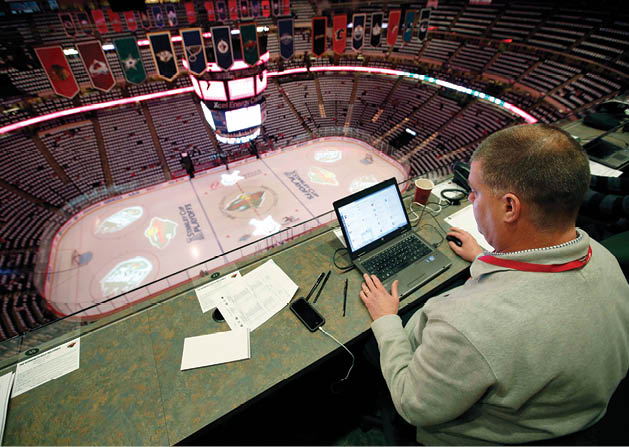It seems a sportswriter’s best stories often have little to do with sports. The Super Bowl, World Series and Stanley Cup championship get fans excited and lead to the bar banter we’ve all come to know (and sometimes love), but often being a sportswriter is about a different kind of story.
The greatest story Chip Scoggins, a Woodbury resident and sports columnist at the Star Tribune, has ever told is of a 10-year-old girl battling cancer. In 2011, she formed a relationship with Gopher football coach Jerry Kill, and helped lead the team on the field for their first game of the season. Scoggins covered the little girl’s story.
“That day before I met her, I was at a red light and it turned green and the person didn’t go,” Scoggins says. “I honked my horn and I’m frustrated, and then I met that girl and I thought ‘Honestly, are you kidding me? I’m honking at someone because they didn’t go on green and this girl is fighting for her life.’ I walked out of there and was like, ‘Wow, this girl is unbelievable.’”
This comes from a man who knew Joe Mauer when he was just a kid at Cretin-Derham Hall (a kid who, even then, everyone knew was destined for superstardom, but a kid nonetheless). A man who’s been blown off by Randy Moss in the locker room. A man whose work takes him behind a curtain to a place most people never get to see.
He definitely has stories, but his favorite is of a little girl with an enviable outlook on life.
Scoggins, recently named Minnesota Sportswriter of the Year by the National Sportswriters and Sportscasters Association, knew from the second he took a journalism class in high school he wanted to be a sportswriter. He grew up playing sports in Tennessee and loved to write, which made being a journalist seem like a natural fit. He followed his passion to the University of Tennessee for two years before transferring to the University of Missouri where he graduated in December 1994 with a journalism degree.
Fresh out of college, Scoggins snagged a job covering sports at the Houston Post and began in January 1995. His job lasted until April. “I covered an event one day and the next morning I got a call from my editor and he said the paper is shutting down,” Scoggins says. “My introduction to journalism.”
Things weren’t all bad in Houston. In fact, Scoggins remembers the time fondly as a great way to break into the industry. It’s also where he met his wife, Amy. At the time, she was working in public relations for the Women’s Tennis Association. A few months after the Houston Post folded, she took a job transfer to Connecticut and Scoggins offered to drive her moving truck north. When they arrived, he found a gig as a sports editor at a small town newspaper and decided to stay. They began dating seriously and over the next few years bounced from Connecticut to North Carolina to Chicago before getting married and settling in Woodbury in 2000 when Scoggins scored a job at the Star Tribune.
“I can’t imagine a better place to live,” Scoggins says of his now hometown. As the couple became more comfortable in Woodbury, Amy decided to run for city council in 2004 and continues to serve. Now with three children, Megan (age 13), Spencer (age 11) and Joe (age 8), the family is a fixture in the community.
“When we first moved here, we were newly married with no kids,” Amy Scoggins says. “Now, 14 years later, life gets very busy trying to figure out how to get everybody from point A to point B. You feel like it’s a miracle when it comes together.”

Chip Scoggins in the media box before game 6 of the Wild playoffs vs. the Avalanche. Photo by Carlos Gonzalez.
Life certainly isn’t slowed by a sportswriter’s hectic schedule. In 2003, when Megan was 2 years old and Spencer was a newborn, Scoggins covered the Wild. Things were crazy at home, but he couldn’t be there because the Wild were in the midst of an unexpected playoff run. “I remember getting up with Spencer in the night to see if the Wild won or lost,” she says. “In a way I felt bad, because I hoped they’d lose so Chip could come home.”
She also knew, and still knows, that travel is part of the job for her husband. Sometimes it’s difficult, and Scoggins says he misses a few dance recitals and basketball games, but they’re really just like any other family that has to deal with crazy work schedules. “It makes it easier when he’s on the road or covering a game on a Saturday that at least I know he is doing what he loves,” Amy says.
Now a columnist, Scoggins’ time is more flexible than it was in his days as a beat writer. In many ways, his new job is a testament to his hard work and the sacrifices he made earlier in his career.
Patrick Reusse, a veteran writer and radio host in the Twin Cities, noticed Scoggins’ work ethic during the very Wild playoff games that kept him from his family. “My vision of Chip is game one of the Anaheim-Wild series in the Western Conference finals in 2003,” Reusse says. “It was a 1 p.m. puck drop, it was scoreless (and stayed that way into overtime, I believe), and there was Chip hacking away five minutes into the first period. I said, ‘What are you writing, Chip? Neither team has had a shot on goal yet.’ He said, ‘I want to have something, just in case.’”
Work ethic and integrity have carried Scoggins to where he is today. It can be a thankless job covering athletes who don’t always want to talk. Especially in a sports market that is always “waiting for the 12th man in the huddle” (a reference to the Vikings snafu in the 2009 NFC Championship game).
In February, the years of work paid off when Scoggins went to Sochi to cover the Winter Olympics—one of his sportswriter bucket list items. Days were long and there were two-hour bus rides (with five transfers) just to get to one event. Good food was hard to come by (at one point he estimates eating McDonald’s for 19 straight days) and although he was lucky enough to have a door knob and shower curtain, unlike some of his writer friends, it lived up to everything he ever could have imagined.
“Reusse told me before I left that when I get done covering [the Olympics], it will be one of the most rewarding things you do in your career because you’ll feel like you accomplished something,” Scoggins says. “And he was right.”
Scoggins has plenty of stories. He can tell you that most athletes aren’t as interesting as you think, and that you never really get to know who they really are. He can tell you what it’s like in a locker room. He can tell you the dirtiest secret of all: That being a sportswriter isn’t always as mysterious and glamorous as it seems. He can tell you about a little girl with cancer who makes cynicism completely disappear, and remind you why you have the greatest job in the world.
“The first time I wrote a story, I decided this is what I want to do,” Scoggins says. “This is all I want to do the rest of my life.”









